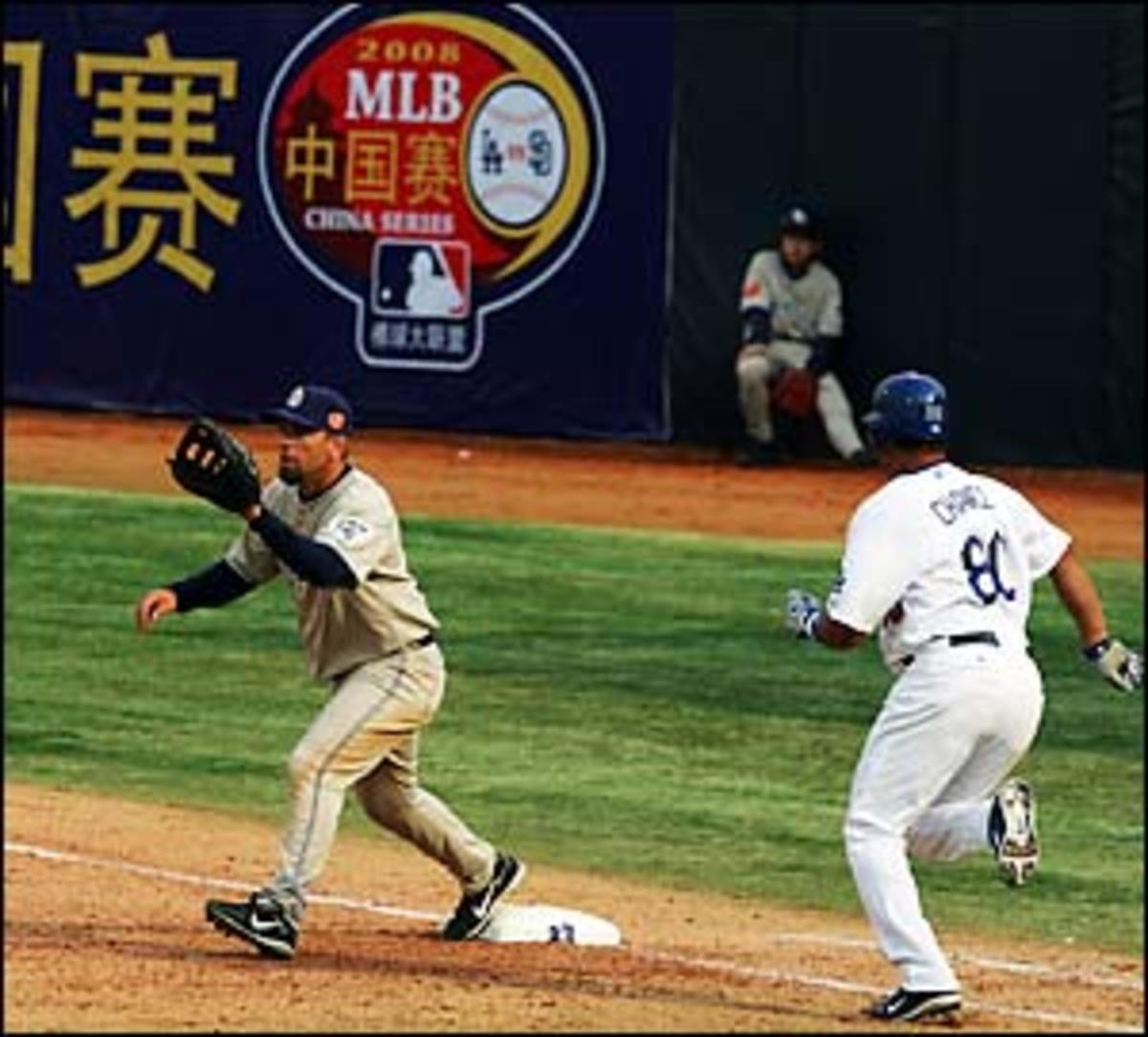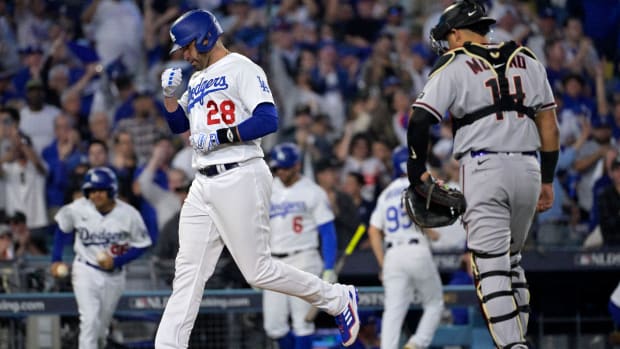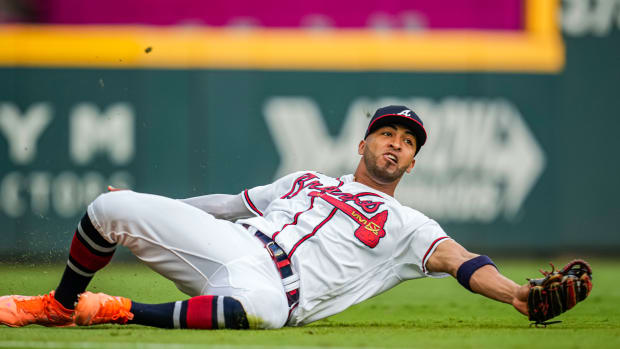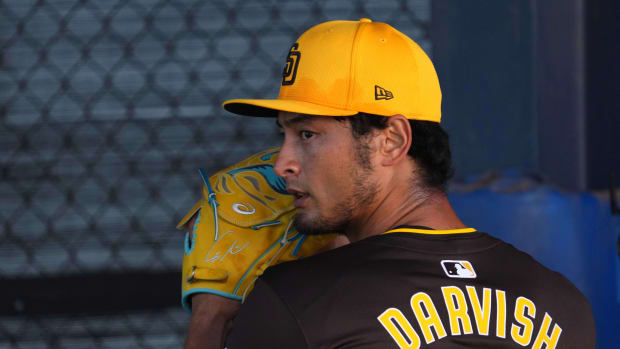
Growing pains
"We didn't know what was happening," Padres reliever Heath Bell said after the game, his right arm wrapped in ice. "What exactly did happen?"
Welcome to China, Mr. Bell, where anything is possible, which also means nothing is impossible. The two exhibition games between the Dodgers and Padres played last weekend in Beijing were a microcosm of what it means to business in this rapidly opening but still largely government-controlled market. The best-laid plans can be swept aside by a single government decree.
At about 1 a.m. on March 15 -- roughly 12 hours before Saturday's scheduled first pitch -- MLB officials were told that there would have to be some changes made "for security reasons," apparently related to the turmoil in Tibet, where police had opened fire to quell the biggest anti-Chinese protests in two decades and fatalities had been reported. Police officials were on high alert and there would be no pregame ceremonies -- never mind the Dragon Dance or 40-piece drum troupe. Security would have to be tightened and metal detectors brought in, even if that meant that many people coming to the game would have to wait in line for close to an hour, missing the player introductions and the first inning or two. And those nice young girls brought in to sing the U.S. and Chinese national anthems? Wasn't going to happen. Apparently the authorities feared handing the microphone to anyone in front of a large crowd, so pre-recorded instrumental versions of the anthems were played instead.
"We thought everything was vetted, but you never know," said Jim Small, MLB vice president for Asia. Underneath the grandstand where he was talking, large red Chinese drums sat stacked against the wall, a reminder of what was supposed to be.
But for all the headaches these changes caused MLB officials, most of the approximately 12,000 fans attending Saturday's first game had no idea about any problems other than the long lines, and both games were largely viewed as unqualified successes. The crowds were heavy with expatriate Americans thrilled to have a little taste of home and be able to share it with their children and friends. There were also sizable contingents of baseball-mad Korean, Taiwanese and Japanese fans. But obviously MLB was here to reach as many Chinese as possible.
Unlike the NFL, which tried and failed to play an exhibition game here last summer, baseball does have some presence in China. It has an office in Beijing and sponsors the Chinese national team as well as a variety of schools, clinics and youth leagues, including a Play Ball initiative that aspires to reach 100,000 8 to 12 year olds in five Chinese cities, teaching them baseball basics through their elementary school PE programs. But these two games were viewed as a key step and, MLB hoped, a key building block for the sport here.
"No one thinks that two games are going to miraculously change everything," said Padres CEO Sandy Alderson, who was involved in MLB's first forays into China when he worked for the league office. "We need to work on several fronts at once, developing youth players as well as the national team, training coaches and umpires and scouts. But these games are also an important step."
Both games were televised in their entirety on national TV, and Chinese-language programs were distributed, explaining some of the basic rules and including the lyrics to Take Me Out to the Ball Game. The concession stands, run by Tim's Texas BarBQ, one of the city's best American restaurants, sold instant noodles along with beef sandwiches, chicken burritos and hot dogs. Unfortunately they ran out of everything early and often, frustrating many American fans. But Chinese events generally feature few concessions and no vendors, so even sporadic visits by young women in Texas flag shirts selling beer, Coke, peanuts and hot dogs were significant.
The stadium, which will be one of three in the complex that hosts this August's Olympic baseball competition, was in good shape. The players pronounced themselves satisfied with the condition of the field -- spray-painted green grass and all. And once the game started, things settled down into a smooth routine. As Dodgers GM Ned Coletti noted during the second game, "There is nothing more familiar to all of us than playing a game of baseball."
In the first game both starting pitchers -- the Padres' Justin Germano and the Dodgers' Chan Ho Park -- were vying for rotation spots, and both turned in strong performances. (Maybe this wasn't such a good idea; one friend suggested that if MLB really wanted to turn on the Chinese public it should have trotted out batting practice pitchers to encourage offense.) Park tossed five masterful innings, cheered on by a significant contingent of Korean fans.
Beijing has a large Korean community, but at least one group of fans flew in from Seoul to watch their countryman pitch. Considering that enthusiasm -- and the crush of autograph seekers who surged toward the righthander as he left a postgame press conference, maybe Park was on to something when he suggested that MLB would be wise to play a game in Korea as well.
The only blemish on Park's performance was a home run by right-fielder George Lombard, who became the first major leaguer to go deep in China with a third-inning blast into the right-field seats. (He was rewarded by being reassigned to minor league camp the next day.)
Dodgers manager Joe Torre kept the Asian connection going by replacing Park with Taiwanese lefty Hong-Chih Kuo, who tossed two strong innings, much to the delight of the Taiwanese, who also rooted hard for Dodgers shortstop Chin-lung Hu.
"We were very excited for this game," said Wei Meng, a Beijing resident who was wearing a Dodgers jersey and hat, as was his wife. "But I tried to get some of my local Chinese friends and colleagues to come with me and no one was interested."
Indeed, most of the thousands of Chinese fans in attendance seemed to have been given free tickets. Further up the bleachers, Li Wang kept one eye on the field and another on his six-year-old son, who was cavorting with a friend. Wang was wearing a Pittsburgh Pirates cap, but don't ask him who Jason Bay is. "I selected it because it is beautiful," he said with a laugh. "Who is the team?"
Li, his son and their friends came to the game because each child at their English-language school was given a free pair of tickets. He said that while he never would have paid for the seats (his tickets sold for 88 rmb apiece -- about $12.50), he was happy to be there. "I am enjoying it," he said. "It's a very interesting sport."
Meanwhile, down on the field, the game was rolling along with an unusual intensity for an exhibition. "It felt more like a regular-season game because we were all pumped up," said Bell. "We all wanted to win this one and you could tell by the way guys were rooting and standing in the dugout -- not typical spring training behavior. During exhibition games guys usually finish their work and hit the shower."
The first game ended in a 3-3 tie; limited rosters dictated no extra innings. The next day the Padres won 6-3 and Bell declared it the equivalent of two wins.
Both teams went directly from the ballpark to the airport for their long charter flights home. They had been in China for four (Dodgers) or five (Padres) days and the players seemed to be universally enthusiastic. Each team featured roughly five regulars and a roster rounded out by minor leaguers. With full squads continuing spring training in the U.S., the starters all had the option to stay home. But those who attended were happy they did.
"I just thought this was a great opportunity to come to China and be a part of something historic," said Padres third baseman Kevin Kouzmanoff. First basemen Adrian Gonzalez was not on the list until he asked to be included. "I viewed it as a once-in-a-lifetime opportunity," he said. "I didn't want to miss it."
One of the most enthusiastic people in the stadium was Jim Lefebvre, the veteran U.S. player and coach who is employed by MLB and on loan as coach of the Chinese national team. He was at both games with his players. He wanted them to watch the pros work out, see how they went about their business, observe how they handled talking to the press and experience the feeling of playing in stadium filled with fans -- games in the fledgling six-team Chinese Baseball League sometimes draw double-digit crowds.
"We're going to look back in 10 years and say 'Remember those games the Dodgers and Padres played?' because it will be a landmark," Lefebvre said. "The growth of baseball in China has to be a two-way street. Together, it can happen. It will happen."


































